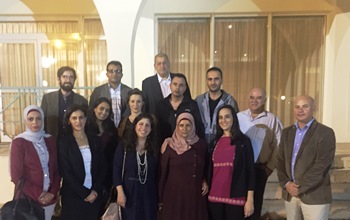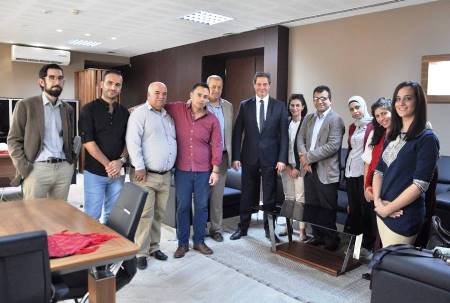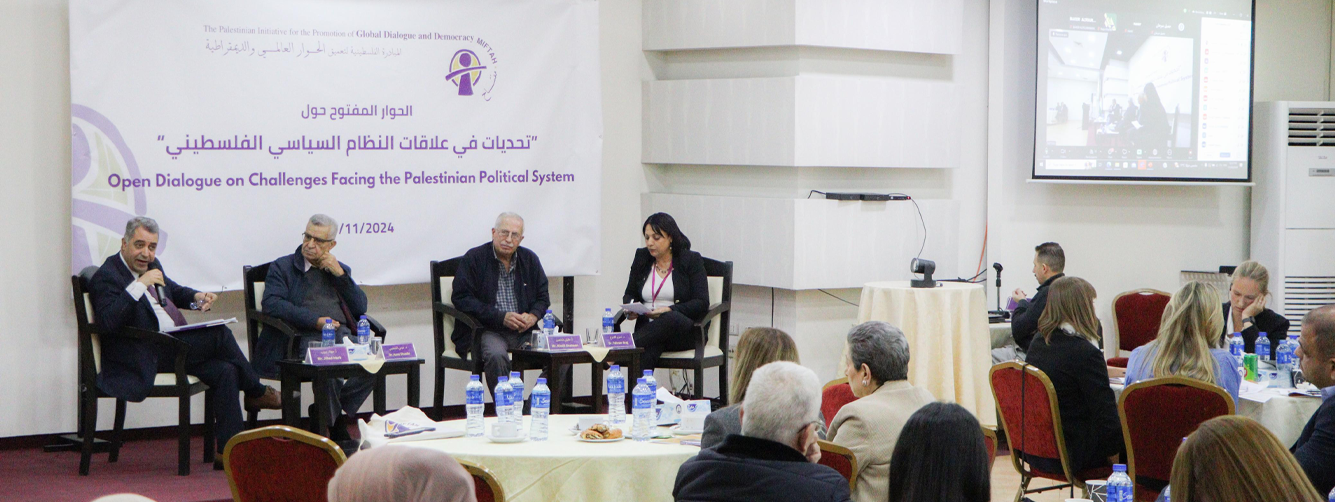
A Palestinian delegation comprised of representatives from the Social Development, Education and Higher Education and Local Government Ministries, in addition to the civil society sector represented by MIFTAH and ARIJ, visited Tunis, Tunisia last week during which several meetings were held as part of a visit to exchange knowledge and experiences on standards of international transparency for budgets and the participatory approach in preparing these budgets. The visit took place between October 16 and 19, 2017.
The visit is part of the Oxfam-funded project “Finance for Development”, implemented by MIFTAH in partnership with ARIJ and AMAN. The project seeks to establish standards of international transparency, including the publication of the citizens’ budget and other goals. In conjunction with the Social Development and Local Government Ministries, the citizens’ budgets for 2016 and 2017 were released and with the Ministry of Education and Higher Education for the 2017 citizens’ budget. Current efforts are aimed at expansion, to include the Ministries of Health and Finance and Planning.
The visit began with a workshop between the Palestinian delegation and Tunisian civil society , which included presentations by the Ministries of Social Development, Education and Higher Education and Local Government in addition to MIFTAH. The Civil Society Team on Promoting Public Budget Transparency joined via Skype. The abovementioned ministries presented their experiences in developing and releasing the citizens’ budgets of each ministry, shedding light on the development projects, achievements, challenges and lessons learned as a model for building and exercising international transparency standards for budgets.
MIFTAH’s presentation showcased its work with the ministries, shedding light on the standards of international transparency and the component of tax system reform in their contribution to achieving social justice. The presentation explained that the Palestinian government adopts three of the eight standards of international transparency for budgets: issuing the pre-budget statement; a ratified and adopted general budget; and monthly and quarterly periodical reports. The remaining five standards are: executive budget proposal; citizens’ budget; semi-annual reports; annual reports and audited annual reports.
Furthermore, the Palestinian delegation met with the Ministry of Social Affairs, the Ministry of Women, Family and Childhood and the Ministry of Local and Environmental Affairs in Tunis over a two-day period during which the delegation exchanged knowledge and expertise with their Tunisian counterparts. The programs of the Palestinian ministries and the experience of issuing the citizens’ budget were presented. On the Tunisian side, represented by the general administration of program planning and budgets, also presented its program and action strategies on the one hand and specified their political priorities and budgetary allocations for these programs on the other, all while taking into consideration that the budget must be gender-responsive and cater to the needs of marginalized social sectors in order to achieve social justice. The delegation met with Tunisian Minister of Local and Environment Affairs Riadh Mouakhar in which they discussed the opportunity to exchange experiences and expertise on supporting the decentralization and transparency of the local government sector.
Anwar Hammam, deputy assistant for governorate affairs in the Ministry of Social Development explained that the citizens’ budget provided the necessary information and knowledge to Palestinian citizens on the work of the ministry, thus influencing the stereotype about the ministry, which is that its work is limited to transferring cash assistance and distributing food packages. “We moved from the idea of planning for the people to participation of the people in the planning process,” he said, adding that the preparation process for the citizens’ budget was in line with the new strategic directives for social development. This, he explained, is based on a participatory approach aimed at promoting local ties. Furthermore, Hammam added, the citizens’ budget is important in the process of social marketing for the ministry’s programs.
Furthermore, Dr. Mamoun Jabr, director general of educational planning at the Ministry of Education and Higher Education explained that publishing the citizen budget at the ministry reflected the importance the government puts on the education sector and how earnest it is in carrying out the national policies agenda for 2017-2022, which specifies the eighth goal for education. That is, the citizens’ budget presents the financial allocations for policies exclusive to education in the agenda and reinforces the ministry’s willingness to sit down with civil society to discuss the details of the education and higher education budget.
General director for financial affairs at the Ministry of Local Government Ghassan Daraghmeh said the publication of the citizens’ budget helped to convey the experiences and viewpoint of the ministry regarding Palestinian civil society institutions in moving from a relationship characterized by competition and collision to the institutionalization of a real partnership which contributes to achieving the needs of Palestinian citizens and expanding the scope of interaction between the two.
MIFTAH coordinator for the project “Finance for Development” Tamara Tamimi said the visit was part of efforts to ensure the sustainability of the capacity development of Palestinian ministries that enable them to adopt standards of international transparency in addition to establishing networking opportunities between Palestinian ministries and institutions and their Tunisian counterparts.
Meanwhile, MIFTAH Director of the Policy Dialogue and Good Governance Program Lamis Hantouli said through these interventions, MIFTAH seeks to develop and support competencies in Palestinian ministries, especially in regards to creating change in the formulation of financial policies in the service of the public interest. It also seeks to promote confidence building and professional dialogue between official and civil society institutions with the goal of ensuring the presence of Palestine before international and regional forums for adopting the criteria and practice of good governance in spite of the unstable political situation and the Palestinian government’s financial crises.










